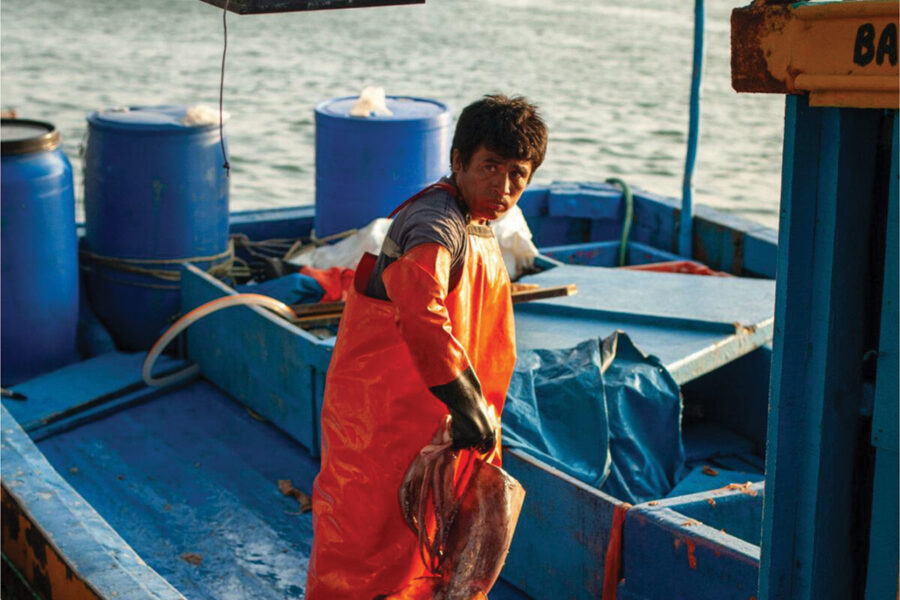The Sustainable Fisheries Partnership (SFP), an international NGO based in Hawaii that works towards sustainable fisheries management, published a paper at the end of August that provides further evidence that involving small- scale fishermen and processors in fisheries management decisions is good for overall conservation.
Published in Ocean and Coastal Management, the study looked at the flying squid fishery in the Pacific, but many of the lessons learned can be applied to fisheries elsewhere. The huge fishery sustains fishermen from Mexico all the way down to Chile.
With the squid migrating, often very quickly, across the boundaries of several EEZs, the 20,000 small-scale fishermen reliant on the stock, who take nearly two-thirds of the total catches, are not members
of the large South Pacific Regional Fisheries Management Organisation (RFMO). This is dominated by large industrial vessels and international members such as China, which fish extensively for the squid in international waters.
The unregulated nature of most squid fisheries in international waters poses substantial risks for artisanal fishers, due to the transboundary nature of the stock and large-scale environment fluctuations, as is the case in the South Pacific. Coastal artisanal fishers struggle to compete with distant-water fleets that often operate with state subsidies.
The study looked at the success of the formation of a committee dealing purely with the squid fishery, which was created to bring in representatives of the smallest vessels, from Mexico, Chile, Peru and Equador.
The study found that involving these fishermen over a five-year period, starting with a workshop that brought everyone together, resulted in huge improvements in management of the fishery and a reduction in illegal fishing, and eventually helped to persuade the larger industrial fleets and member states to adopt new conservation rules.
“Fisheries policy and management impact the livelihoods of entire coastal communities,” said Enrique Alonso, global fisheries director at SFP and a principal researcher in the study. “Yet artisanal and small-scale fishers are rarely engaged in decision-making.
“This is especially the case in managing the high seas. As a result, fisheries are typically managed without the interests of artisanal and small-scale producers, even when they are the largest stakeholders.
“When the artisanal squid fishers and processors learned about the RFMO process and how to engage, they knew they needed to have a voice and organise if they wanted a fair playing field. This is the first time artisanal fishers and processors have strategically mobilised and engaged at a scale to achieve policy results in a squid RFMO. We hope this can be an example for other communities around the world.”
The paper concludes that the membership of the small-scale fishermen was instrumental in advancing the discussion about critical issues such as effort limitation and increasing the use of onboard observers on larger vessels in the fishery.
In particular, its analysis suggests, the fishermen were instrumental in triggering proposals by national delegations, such as the EU and Ecuador, and in garnering support for fisheries improvements by other delegations such as Peru and China, whose engagement has been slower.
As a result, in 2023, a new regulation was enacted that sets limits on fishing effort and improves controls over transhipments in the squid distant- water fleets. This is a historic milestone in the management of squid on the high seas.
Enrique Alonso said: “Local fishing communities are heavily impacted by the actions or inaction of international management bodies. The high reliance on the jumbo flying squid resource within EEZs exposes these communities to significant risks.”
The finding that involving working fishermen in developing management regulations and conservation of their fisheries produces positive results is hardly new. Plenty of other studies have shown that conservation regulations imposed on fishermen rarely have the intended effects, and often fail to achieve their conservation objectives. Nonetheless, as the UK moves forwards with a host of new measures in the marine environment, not least towards the creation of new HPMAs and the formulation of dozens of Fisheries Management Plans, the message that providing fishermen with the tools to make decisions is the most successful way forward is one that both politicians and NGOs need to be reminded of.
The paper can be read here.
This story was taken from the latest issue of Fishing News. For more up-to-date and in-depth reports on the UK and Irish commercial fishing sector, subscribe to Fishing News here or buy the latest single issue for just £3.30 here.
Sign up to Fishing News’ FREE e-newsletter here.








